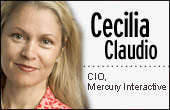The CIO with 'street cred'

 |
CIO 1-on-1 Blonde and attractive, Cecilia Claudio would not look out of place inside the pages of a lifestyle magazine. Yet the 20-year IT veteran is really more at home commandeering Mercury Interactive's use of information technology worldwide.
Prior to coming onboard Mercury last October as the company CIO, Claudio sank her teeth into IT working with companies such as document management company Xerox, fashion chain The Gap, and office equipment maker Olivetti. She has also held positions as executive vice president and CIO of Zurich Financial Services, and more recently, as CIO and vice president of engineering at Align Technology.
Mercury is a maker of tools used to test and monitor business applications.
Not one to shy away from making tough calls, Claudio showed her mettle when in 1996, she reclaimed her then-company's outsourced IT--bringing it back in-house--when she grew dissatisfied with poor service levels and increasing costs.
She shares with ZDNet Asia her experiences, and reveals that thanks to her background as a user of technology, customers are more receptive to her testimony on the benefits of establishing proper IT governance implementation.
Born a Portuguese, Claudio holds a degree in Philosophy from the University of Lisbon, Portugal, and is married to Lars Rabbe, CIO of Yahoo.
Q: You've had a wealth of experience from working in different industries outside of IT. How has that helped you now that you're in the tech space?
A: One thing that I've come to realize is that regardless of industry and size of company, the IT biz is very similar. You leverage the knowledge of running the IT organization from company to company, and you use the same best practices regardless of where you are.
I've been a customer of Mercury for quite a long time. In most of my CIO roles, I've had Mercury products inside my organization. So coming to this company, I really felt that it gave me the opportunity to now see things from the inside-out. I can start relating to how the product gets developed, how the product actually taps into a need that exists in the marketplace, and how I can influence the set of features and functionalities that should be and could be built into the product. I'm able to do from having had the experience of running through the CIO roles that I've had in the different industries.
How much time do you spend on product development and managing the IT house at Mercury?
My first priority when I joined Mercury was running the IT organization and understanding what the issues were. Once I had a sense of what were the things that needed attention, and once I had created and put my team together, I then reached out... first to my key business customers, then the people in product and development, research engineering, and finance, marketing, sales, and so on.
| I think I add a lot of extra dimensions to the sales cycle by being able to speak of personal user experiences. |
They are coming to me to help them synthesize processes, work through what are the key items on the agenda that other CIOs worry about, and overall, help them test new product features and functionalities that they're developing first before the product gets into the marketplace.
You're saying that your customers feel more at ease knowing that you came from a similar background as them, and knowing the pain points that they have?
Absolutely. Some of the feedback that I'm getting from other CIOs is that, yes, they want to talk to sales and product development people inside Mercury, but ultimately, they want to talk to the CIO.
I recently participated in a sales cycle for a very large retailer in the United States. The retailer said to me: 'You know, it really helped us to hear how you're using the products. Yeah, we get to hear from sales, but I want to hear from you. It has really helped us to make our minds up if we heard from the CIO of Mercury.' I think I add a lot of extra dimensions to the sales cycle by being able to speak of personal user experiences.
Within Mercury, how do you achieve aligning IT better with business?
I have started using internally, and very diligently, the ITG (Mercury's IT Governance product) to govern all the requests coming from the business units to deliver projects, solutions, and enhancements to existing systems. So I have taken the way the tool works, and all of the surrounding practices and processes that the tools recommend, and have put in place my own 'board of directors".
I am the chairperson for my board, and my CEO and CFO sit on the board, the heads of the different business units sit on the board. And when we come into the meeting to make decisions about which projects we should be investing in and how we should deploy capital to the different requests that are coming to us, we work from a truly enterprise-level perspective. We don't bring into the table our silo, functional area hat.
I read about how you made a decision to bring an outsourced IT solution in-house, back into the company that you were working for then. How did you manage that?
When you walk into an organization, the first thing that I tend to do is really to assess relationships with my internal peers, partners and also relationships with vendors. What is it you're getting for the money that you spend? If you don't have a sense of a relationship that is truly a partnership, that they're there just for the short-term to make a lot of money, not there long-term to help me deliver the best solutions, you know that the vendor is not a partner. And that's the situation I found in the company that I joined.
I looked at the outsourcing agreement that we had and it wasn't working. It wasn't working for anybody. We were not achieving the results, we were constantly going back to the contract and looking at the terms and conditions of the contract to try and get them to give us refunds, to try to get them to do things for us that were not spelt out properly. I felt that the best outcome would be to cut the cord, and to let the organization go back to doing its own internal development and its own internal infrastructure support.
It was actually not too difficult because the people who had moved from the organization to the outsourcer, had remained with the outsourcer. Bringing them back was actually something they had been looking forward to doing. And when I brought them back, they had this extra incentive to be successful because they didn't like being on the other side. They couldn't do what they needed to do to support the company because they were bound by the terms and conditions of the contract.
From your experience, what advice would you give to companies who want to outsource?
I'm outsourcing right now. The best advice I can give is just because you outsource, you don't ever abdicate your responsibilities. You continue to manage your outsourcer very closely. You make them a part of your day-to-day organization. When you walk away, you give up the ability to achieve the outcomes you were looking for.
You're a rarity in a male-dominated world. Have you faced any challenges that came as a result of your gender?
Very often, during work events, I would be one of few women surrounded by men. But I've never limited myself. Sometime women put limits on themselves and that holds them back.
Today, there are a lot of young women that have achieved a lot. Back in 1970 when I first started, I was definitely considered a rarity, and I was frowned upon. But I said I was going to move away, to the United States, and not have a traditional lifestyle. It was very radical at that time.
Zurich (where Claudio had once worked)… is a country that has still a lot of hang-ups about women who are in charge. It was tough, it was difficult. Soon after I got in, the local newspaper wrote about my management style… it was not expected to have a woman at this high level, who has a management style that is focused on accountability, results, delivery and achieving what you said you were going to achieve. So they were sort of shocked that a woman could have that kind of management style that was only expected of men.
There were some drawbacks but you're given a set of goals and you have your metrics that you're managed by. And at the end of the day, it's a business.
I understand that your other half (Yahoo's Lars Rabbe) is also a CIO.
My better half (laughs).
Because our careers had developed very much in the same way, we have not lived together for a long time. We were living in different parts of the world. When I was in Zurich, he was in California. We would see each other every two to three months, so we've had to make some personal sacrifices.
My career is very important to me. I knew that early on when I grew up in Portugal, that I needed a different type of profile from the peers whom I grew up with. So I looked for a partner who understood that and gave me the space and the support that helped me achieve what I wanted to achieve.